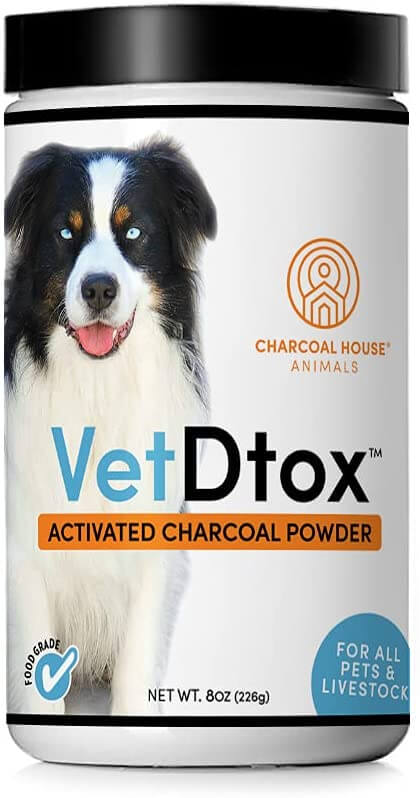Activated Charcoal in Dogs | Usage
22.11.2021.
If you’re a dog owner, you already know how much time you spend making sure your dog doesn’t eat something potentially toxic. One of the ways dogs explore the world around them is through chewing, and they can easily chew or swallow something that can harm them.
Even our homes contain things that can easily poison our dogs; alcohol, chocolate, antifreeze, and cleaning chemicals are just some of the things that could be fatal for our beloved pets. If something like that happens, you might want to have activated charcoal close by. Here’s what you should know about activated charcoal in dogs.
What is activated charcoal in dogs?
The easiest way to describe activated charcoal is - it is a medication. Its main goal is to absorb toxins the dog might have ingested and ease the toxin’s effects on the dog’s body. Think of it this way - it’s better to ingest a tiny bit of toxins than a lot of it. It is a commonly used treatment for dog intoxications. Your pet ER or your primary care veterinarian can easily administer the drug. Activated charcoal is often given in case of several types of intoxications.
VET TIP: You might want to have this medication at home. You can be extra careful regarding your dog and toxins, but accidents can happen. In those cases, it is best to be prepared, even if you end up never using it.
How does activated charcoal in dogs work?
As we already mentioned, activated charcoal’s primary goal is to absorb toxins and reduce their effect. If your dog eats something toxic, you can administer this medication immediately. This drug is made by heating wood or coconut shells at high degrees. This process naturally creates charcoal.

The “activated” part of the name refers to the process of creating microscopic nukes and crannies. This process will encourage the absorption of toxins. When the dog ingests a toxin, the activated charcoal will start absorbing them immediately. It will go through the dog’s entire gastrointestinal system, and in every part it reaches, it will absorb toxic chemicals.
Is it effective?
The good news is that activated charcoal is very effective. Veterinarians can testify about hundreds of cases each year. Vets or owners gave dogs activated charcoal after the dog ingested something potentially deadly. They can tell you how many cases ended up with dogs that completely recovered. Activated charcoal can remove 80% toxins in just 180 minutes. That is very impressive and can be considered highly effective. However, there are specific toxins that activated charcoal can help with. Unfortunately, some toxins will not get absorbed by it.
What is the correct activated charcoal dosage for dogs?
The exact dosage should be determined by your vet. However, as a general rule, the dosage should be 0,5 - 1,5 grams per pound of body weight.
What toxins is activated charcoal effective against?
The best thing you can do is get familiar with potential intoxications that happen at home and what you can do about them. Naturally, the first thing you should do is call your vet or Pet Poison Helpline at 800-213-6680. However, reacting quickly and giving your dog activated charcoal can mean the difference between life and death. Here are some of the things activated charcoal is effective against;
- Ibuprofen
- Strychnine
- Pyrethrins
- Prescription medications
- Bromethalin
- Chocolate
- Rodenticides
- Marijuana
- Aspirin
- Narcotics
- Acetaminophen
In some toxicity cases, a smart thing to do would be to induce vomiting. However, you should not do that if you don’t know how to do it safely. This is usually done only when you know exactly when your dog ingested toxins and their breathing is not compromised. You can read more about it here - How to make your dog vomit?
What is activated charcoal ineffective against?
As we already mentioned, activated charcoal cannot help with all toxins. It is not a universal drug you can give to your dog and expect them to feel better. It can only be used under certain conditions, and you should know when not to use it. Of course, you should call your vet or Pet Poison Helpline. They can give you the best advice regarding the specifics of your dog’s case. Nevertheless, here are the toxins activated charcoal is not effective against;
- Alcohols - Types found in fragrances, windshield wiper fluid, rubbing alcohol, hand sanitizer, vanilla extract, etc.
- Petroleum distillates - Found in gasoline, transmission fluid, lip gloss, kerosene, xylene, and pesticides.
- Heavy metals - Things like iron, lead, copper, lithium, arsenic. Often found in batteries, electronics, cosmetics, and fireworks.
- Other chemicals - Paraquat, xylitol, metaldehyde, mineral acids, caustic alkalis, and ethylene glycol.
- Inorganic toxins - Things like multi-purpose cleaners, detergent, tooth whitening products, bleach, fertilizers, nail glue removers, and furniture polish.
Is it safe?
The second most important thing most dog owners want to know is, “Is activated charcoal safe for dogs?” Naturally, we all assume it is safe since its job is to absorb toxins. That assumption is mostly true. Activated charcoal is considered safe for dogs, and most dogs that use it have little to no side effects. However, there are some things you could expect, and you should be aware of them, so you don’t get worried or surprised if you come across them.
Side effects of activated charcoal for dogs
Like any other medication, even activated charcoal can cause specific side effects. The good news is that most dogs won’t have them. Here are the most common side effects of using activated charcoal in dogs;
- Vomiting
- Diarrhea
- Constipation
- Eye irritations
- Black, tarry feces
VET TIP: While activated charcoal is safe for most dogs and effective against certain toxins, some dogs should not take it. More precisely, dogs with gastrointestinal hemorrhaging and bowel impaction. Dehydrated dogs should also avoid this medication because it can lead to life-threatening issues like aspiration, gastrointestinal blockages, and hypernatremia.
What if my dog is already taking medications?
If your dog has to take different medications and ingests something toxic, they could take activated charcoal. However, you should know that the absorption and effectiveness of those medications will be reduced. The best thing you can do is call your vet and ask for further instructions. This is a difficult question to answer since the effects will be different for different medications.
Where can I get activated charcoal for my dog?
Activated charcoal comes in several forms - liquid, powder, or pills. It is not a prescription medication, so you could easily get it in your local or pet pharmacy. If you prefer ordering it online, Amazon has several great options. Keep in mind to keep enough at home for your dog in case of severe toxications. Your dog might require a large dosage, and you don’t want to end up not having enough.
World Dog Finder team








Share